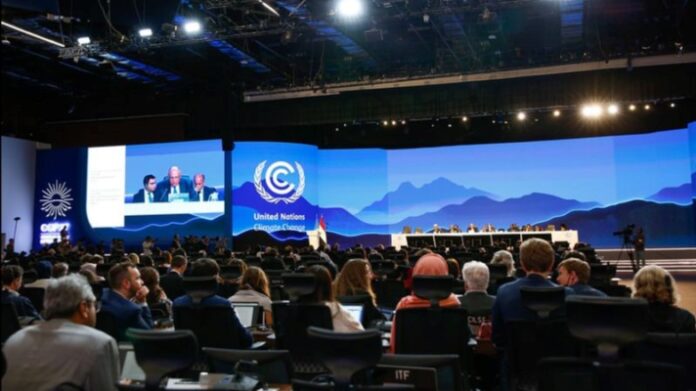The COP 27 may have closed two-days later than scheduled but anti-climate change vulnerable states will access an average US$230 million in adaptation by 2030.
The COP 27-deemed the hope for restoring ‘Africa’s loss and damage’ incurred envisages that the financing will be disbursed to help in mitigations by vulnerable communities through concrete adaptation solutions, says its President Sameh Shoukry in a statement seen by FRA.
The adaptation agenda, according to Shoukry and dubbed: “the Sharm el-Sheikh Implementation Plan” will help enhance resilience for people living in the most climate-vulnerable communities by 2030.
The UN Climate Change’s Standing Committee on Finance had during the deliberation been requested to prepare a report on doubling adaptation finance for consideration at COP28 next year.
Under the plan it is envisaged will help move a global transformation to a low-carbon economy once an investment averaging US$ 4-6 trillion a year is made although delivering such funding will require a swift and comprehensive transformation of the financial system and its structures and processes, engaging governments, central banks, commercial banks, institutional investors and other financial actors.
Serious concern was expressed that the goal of developed country Parties to mobilize jointly US$100 billion per year by 2020 has not yet been met.
The developed countries-key emitters of greenhouse gases have been urged to meet the goal, and multilateral development banks and international financial institutions called on to mobilize climate finance.
Other deliberations hinged on among other milestones, setting a ‘new collective quantified goal on climate finance’ in 2024, taking into account the needs and priorities of developing countries.
“In this text we have been given reassurances that there is no room for backsliding,” said the UN climate change head, Stiell. “It gives the key political signals that indicate the phasedown of all fossil fuels is happening.”
COP-27 attracted motivated urge for making progress on adaptation, with governments agreeing on the way to move forward on the Global Goal on Adaptation, which will conclude at COP28 and inform the first ‘Global Stock take’, improving resilience amongst the most vulnerable.
And climate change global campaigner-WWF argues that the deliberations at the just ended COP 27 fell far short of the Glasgow summit claiming that climate ambition has not advanced since COP26.
Although the COP27 climate summit made a welcome step towards a loss and damage fund, but by failing to agree to more ambitious action on emissions reductions, the goal of limiting global warming to 1.5°C is slipping away with disastrous consequences for the world.
Manuel Pulgar -Vidal, the WWF Global Climate and Energy Lead, and COP20 President, contends that while “The loss and damage deal agreed is a positive step, it risks becoming a ‘fund for the end of the world’ if countries don’t move faster to slash emissions and limit warming to below 1.5°C. “
The failure to redress the phasing out of fossil fuels at COP27, implies that leaders that assembled to add voices to reverse the climatic change losses, have missed the chance to accelerate the elimination of fossil fuels, keeping us on course to climate catastrophe.
Without rapid and deep emissions cuts we cannot limit the scale of loss and damage.“We cannot afford to have another climate summit like this one. It is unacceptable that negotiators have failed to reach a more ambitious agreement than that agreed in Glasgow last year.” Vidal argues
Alice Ruhweza, the WWF Regional Director for Africa, adds a voice claiming the outcome has betrayed the confidence of the people that thought hosting the summit on an African soil would help reverse previous concerns on the needs and priorities.
“This was meant to be an ‘African COP’, but it has failed to deliver on the continent’s needs and priorities. “he says
“Africa is on the front lines of the climate crisis and is highly vulnerable to its impacts. We are already seeing terrible impacts and loss and damage across the continent.
WWF while ululating on the progress in establishing a fund to help countries recover from climate-related disasters, it is not enough without more action to prevent the climate crisis from spiraling out of control.
It calls for concerted efforts to push further to ensure that the fund is resourced and is aligned with equity and justice.
It seeks a global lobby for more finance and action to increase Africa’s resilience, but yet again finance commitments for adaptation were not met.”
Dr. Stephen Cornelius, WWF Global Climate and Energy Deputy Lead, observes other significant shortcomings that need redress.
“Nature has absorbed 54% of humanity’s carbon dioxide emissions over the past 10 years, so it is good to see countries recognise the importance of nature-based solutions in the final COP27 cover decision. But action on nature alone will be futile without parallel action to rapidly cut emissions.
COP27 brought together more than 45,000 participants to share ideas, solutions, and build partnerships and coalitions.
Indigenous peoples, local communities, cities and civil society, including youth and children, showcased how they are addressing climate change and shared how it impacts their lives.
At the opening of the much touted COP 27 in the Egyptian-shore city, delegates had agreed to adopt it as an agenda item.
Key was that, the proposal by the Africa Group of negotiators for developed countries should meet the costs incurred by developing countries when repairing infrastructure damaged by floods and other extreme climate conditions.









